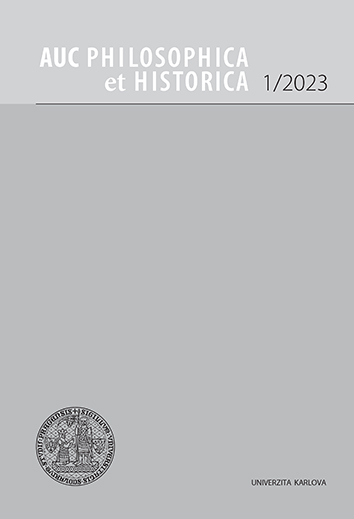AUC Philosophica et Historica je víceoborový akademický časopis zaměřený na humanitní a společenskovědné obory (filozofie, psychologie, pedagogika, sociologie, obecné, české a hospodářské dějiny, pomocné vědy historické a archivnictví, etnologie).
Časopis je indexován v databázích CEEOL, DOAJ a EBSCO.
AUC PHILOSOPHICA ET HISTORICA, Vol 1984 No 1 (1984), 9–20
Engelsův přínos k hodnocení vývoje českého národního hnutí v druhé polovině 19. století
[Engel's Contribution to the Evaluation of the Czech National Movement in the Second Half of 19th Century]
Antonín Vaněk
DOI: https://doi.org/10.14712/24647055.2018.76
zveřejněno: 15. 01. 2018
Abstract
The creation of the new Czech nation was connected with social changes that represented the condition for the development of capitalist social relations and therefore the Czech Revival became the period of the creation of the Czech nation, but it went on even in .the later period and it culminated by the proclamation of the Czechoslovak state in the year 1918. The political crystallization in the whole of Europe and in Austria was accelerated by the revolutionary year 1848. The weak Czech bourgeoisie was not yet prepared at that time for the new democratic tasks and above all they did not understand the relation of the Czechs to the German revolution and to the revolutionary movement of the Hungarian and Polish people. F. Palacký and F. L. Rieger and all the liberal bourgeoisie took up a conservative and sociologically incorrect attitude based on the demand for democratic rights for the individual nations. but within the framework of the political and conservative empire and in the union of bourgeoisie and aristocracy. After the defeat of the June rebellion the Czech bourgeoisie openly and deliberately switched to the camp of contrarevolution and oriented itself on the agreement with Vienna. This policy was justly criticized by the founders of Marxism this task being carried out theoretically and from the position of class approach by F. Engels on Marx's request in April1855. In his treatise he criticized panslavism and in the evaluation of the problems of the individual nations he stressed the social contents. His practical help to the Czech labour movement in the 80s and 90s must also be appreciated. Engels's consent to the first book publication of the Communist Manifesto in 1893 became.an important theoretical act with positive influence on the Czech sociological ideas.
